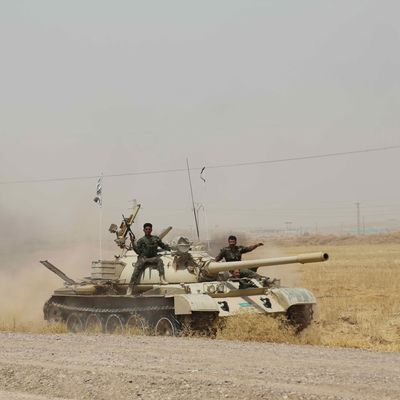
Overnight, Iraq moved closer to full sectarian fragmentation and the United States, more surprisingly, moved closer to intervention. On the ground, the advance of the Sunni radical group ISIS (the Islamic State of Iraq and Syria) has already captured Mosul, the second-largest city in Iraq, Tikrit, and much of the Sunni homeland; overnight, an ISIS spokesman urged his fighters to press on to the “filth-ridden” Shi’ite shrine city of Karbala. Farther north, Kurdish militias have secured the oil-rich city of Kirkuk, where most of the people are Kurds. ISIS is now threatening Samarra, directly between Baghdad and Mosul, where the defense is being arranged not just by the government but by Shi’ite militias. The Iraqi state — in the hands of a Shi’a political party, and increasingly a Shi’a operation politically and bureaucratically — is seen as vulnerable enough that the great Shi’a clerics issued calls overnight for the faithful to join militias and assist in the country’s defense. The Kurds, the Sunnis, and the Shi’a are all securing their own ethnic territory. It seems less a counterinsurgency than a full-blown civil war.
In Washington, the mood seemed to shift radically, following the continuing advance of ISIS, and there are now some indications that we may very well be intervening in Iraq in some way in the next few days. “It’s fair to say,” President Obama said yesterday, “there will be some short-term, immediate things that need to be done militarily.” Sources in Maliki’s offices told the Washington Post that Obama had “agreed to imminent airstrikes.”
The most vexing question for the White House is no longer whether it is politic to recommit itself to military intervention in a country where it had celebrated victory and from which it had removed its remaining military forces, though that had been the talking point on Wednesday. Nor is it any hesitancy about who we would be bombing — no one has any sympathy for ISIS. The problem lies in who we would be helping. Increasingly, the Iraqi state has come to resemble a Shi’a sectarian defense party. This has long been coming — Maliki, who once burnished his reputation in the West by cracking down on militants from within his own religious community, has more recently purged Sunnis from the government, bureaucracy, and military. The Wall Street Journal reported this morning that Iran’s paramilitary Quds force was moving into Iraq, to help support Maliki. Which means that any American intervention would be on the same side as what remains of the Iraqi state, Shi’a militias, and Iran.
The hope is that ISIS will prove to be simply too radical to become the political voice of Sunni Iraq, that even less ideologically severe Sunnis would flee from them and prefer the protection of the Iraqi state. ISIS’s brutal interpretation of religious law — floggings, stonings — helped lead even Al Qaeda to formally sever ties with the group. But ISIS has established working courts, moved strategically to control oil resources, and is even — according to reports earlier this week — taking advantage of captured power plants to sell electricity back to the Syrian government it is trying to overthrow. Overnight, there were new reports that some of those Sunni refugees who had fled Mosul when ISIS captured it were returning to it, thinking their chances of survival were better under the insurgents. It is too early to know whether this is real. And ISIS is not yet operating a Sunni state. But perhaps it is operating something that might grow into a state, an embryonic form.
During the 2008 presidential race, Joe Biden repeatedly pushed his plan to partition Iraq into a federation separated along sectarian lines — states for the Kurds, the Shi’a, and the Sunni, semi-autonomous but sharing national defense, foreign affairs, and oil revenue.”The only way you get control is if one of three things happen,” Biden said then. “One, one side wins in a bloodbath … two, the desire to fight expires … or three, you install a federal system.” Probably a federal system of the kind Biden hoped to build would have been impossible for the United States to achieve. But it is startling, now, to realize that we may be headed toward a more violent and unstable version of this sectarian split, one not designed by Biden’s preferred option, federation, but by what he feared, the bloodbath.





























